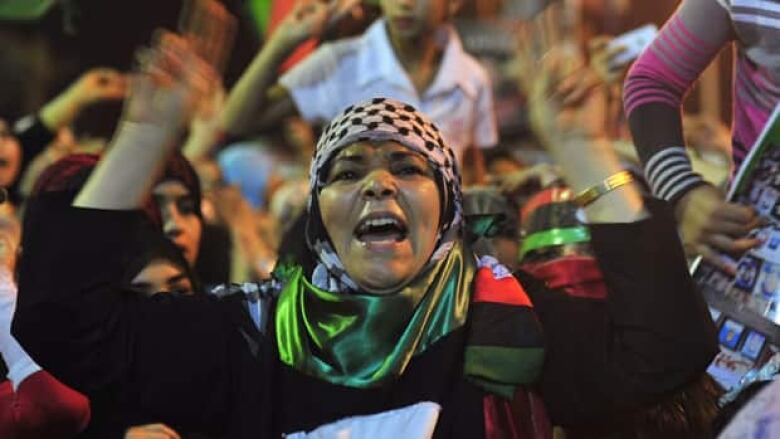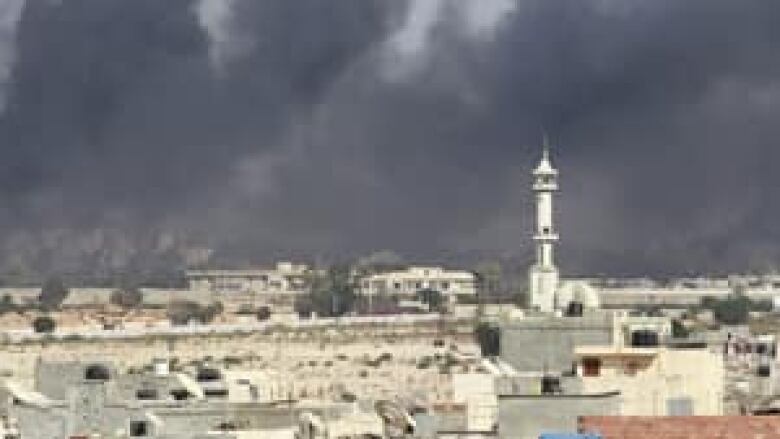ANALYSIS: Post-Gadhafi Libya faces enormous challenges

With the end of Moammar Gadhafi'sregimeseeming to be a forgone conclusion, attention is now focusedonwhat's next for the North African country.
Observers say the rebel-formed National Transitional Council (NTC), recognized by a number of countries, including Canada and the U.S., as the legitimate government of Libya, faces no shortages ofobstacles in a post-Gadhafi world,including an economy in shambles anddecimated infrastructure.
Libya's transitional administration will also need funds, which have been frozen,to make sure public sector workers like policemen or nurses are paid, stores have sufficient supplies and the economy can be developed again.
"The challenges ahead for the Libyan rebels and for the council are enormous," Ibrahim Sharqieh, director of the Brookings Doha Center, said in a recent radio interviewwith The Takeaway. "This new battle, as I call it, for Libya, is the battle for development, a battle of reconstruction and creating the structures and creating a state."
Sharqieh said neither the rebels nor council have the experience for building or rebuilding a nation state, as the Gadhafi regime allowed no political parties or no civil society to exist.
"The Libyans have to literally start from scratch," Sharqieh said.
Daniel Serwer, of the Middle East Institute, recently wrote that humanitarian concerns remain, including the more than one million refugees who have fled the country.While rebel-held areas have, so far, not suffered a humanitarian crisis, risks remain, he wrote.
One of the immediatepriorities will beensuring or restoring public order.

"If we see a lot of widespread looting and people taking their frustrations out on any pro-Gadhafi supporter they can find, and start going on a tear of revenge killings, then the situation is going to break down," Bayless Parsley, who specializes in North African issues at STRATFOR, a global intelligence company, told CBC News. "So they need to restore security immediately."
Council has little in common
The transitional council itself will also face the challenges of finding common ground.
"All of the people part of this group have only two things in common one, they're referred to collectively as Libyan rebels, and two, they all shared a common desire to oust Gadhafi," Parsley said. "Once you strip away the mission to push him out, there's basically no unifying factor."
"What is critical to the future of Libya is how the rebel forces are able to reconcile their various differences in terms of coming to some sort of agreement over how they're going to share both political authorityas well as all the economic rewards they expect to get," Parsley said.
The role of the international community
Daniel Serwer of the Middle East Institute saidthe European Union should lead an international post-Gadhafi stabilization, under a UN umbrella. As well, there shouldbe a paramilitary police force of up to 3,000 personnel in the initial stages.
Serwer said Europeans have more interests than the U.S., and stand to lose a lot if "all hell breaks loose in Libya. They get the refugees if there's chaos, and they don't want this."
"I regard this as the greatest challenge for American diplomacy to get the Europeans to step up."
But Serwer acknowledged the U.S. should be prepared to mobilize NATO forces if the UN/EU operation fails to stabilize post-Gadhafi Libya.
Reconciling those differences will be difficult, Parsley said, considering the tribal nature of Libyan society where there are many "scores to settle."
"It's going to be a matter of time when there will be serious problems for the NTC to govern this country."
Parsley said he doesnt see Libya following the path of post-invasion Iraq, but that its situation could be comparable toSomalia in 1991 and Afghanistan in 1992. In those cases, the rebel coalition defeated the incumbent government and ended up turning against itself, breaking down into infighting and that they couldnt agree to a common platform.
Civil war a possibility
As for a civil war,Parsley said "there's a very real possibility."
"You take away the common bondof wanting Gadhafi out and everything breaks down."
Serweradded thatit's important for the council tobroaden representationand bring in more people from western Libya.
"It has laid out some pretty clear and well-crafted plans," he said of the council. "The constitutional charter is a good document. The question is are they capable of implementing and I dont know the answer to that."
While sectarian conflicts highlighted the problems in Iraq, Serwer said regional frictions in Libya are a challenge, especially between the capital of Tripoli and the city of Benghazi, the temporary headquarters of the NTC.
Regional frictions
"I think the problem in Libya will be the Benghazi/Tripoli split. A lot of the oil, gas is in the east and Benghazi has long felt disadvantaged thought of themselves as better than Tripoli and disadvantaged. You have some considerable regional frictions."
Parsley agreed it will be very difficult for the council, based in Benghazi, which is historically a different world from Tripoli, "to go into the capital and establish its political authority without any opposition or resistence."
But in Libya'sfavour, according to Serwer, isLibyans ability to organize community councils very quickly and easily. He saidthat has kept order in rebel held-areas and, so far,kept electricity and water flowing.
"That's a very good sign. That doesnt happen in all counties," he said in an interview with CBC News.
Serwer added that the country also has ample financial resources, if itsassets can be unfrozen.
"I'm optimistic that there is an opportunity here," hesaid about Libya's future. "If we can get a few things right, Libya starts off in the right direction. In five years, we may say that things really are improving and 10 years we'll say, we did do the right thing in Libya."
With files from The Associated Press












_(720p).jpg)


 OFFICIAL HD MUSIC VIDEO.jpg)
.jpg)



























































































